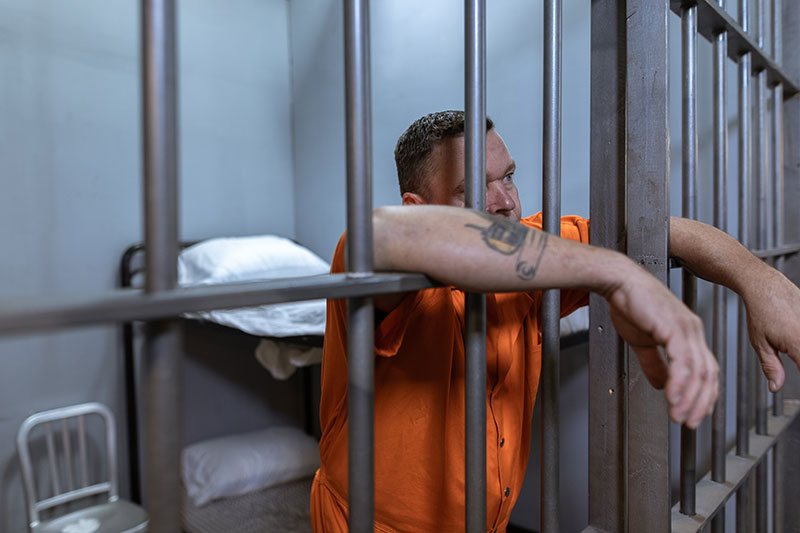Disclaimer: The information on our website is provided for general information purposes only. We make no representations or warranties of any kind, express or implied, about the completeness, accuracy, reliability, suitability or availability with respect to the website or the information contained on our website for any purpose. Any reliance on such information is therefore strictly at your own risk and we are not liable for any damages or losses arising out of or resulting from your reliance on any information contained on our website.
Correctional officers monitor prisons and jail inmates. Because of this, their tasks include maintaining security and peace at all times, breaking up disputes, and responding to emergencies. Additionally, these officers must be aware of their surroundings at all times. Watch a video to learn what a correctional officer does:
How to Become a Correctional Officer
A correctional officer would need at least a high school diploma or the equivalent to be considered for employment. However, some state and local corrections agencies ask for some college credits as well. To become a correctional officer, you will attend a training academy and receive on-the-job training. Those with military experience or law enforcement backgrounds may already meet the education and experience requirements.
Job Description of a Correctional Officer
A correctional officer supervises the inmates at a jail or prison that are awaiting trial, serving sentences or have been arrested. They are charged with enforcing rules and regulations while overseeing the daily activities of inmates. The officer must be constantly aware of the location of any given inmate at all times and prevent disturbances, escapes or assaults. A correctional officer may use handcuffs or leg irons to transfer inmates from one place to another and make reports of conduct, condition or corrections used for any person. They enforce punishments when necessary and search prisoners for illegal contraband, like, drugs or weapons.
They would search the prison cells and other areas and include searching for any breach in security or other dangers. An officer may aide an inmate with a rehabilitation process by encouraging educational opportunities and counseling. This occupation carries a higher than average rate of injury and danger due to prison violence and other hazards.
Benefits of Being a Correctional Officer
Correctional Officers enjoy numerous benefits, starting with comprehensive packages that encompass health, vision, and dental insurance, alongside paid sick leave and vacation days. Additionally, they can avail themselves of 401(k) plans, military leave, and shift pay, with some businesses extending community service discounts. Moreover, these officers often receive education incentives to meet the educational prerequisites for their correctional careers, further enhancing their qualifications.
In the realm of job security, Correctional Officers find themselves in a promising position, given the consistent demand for their expertise throughout their careers. Working within a close-knit team ensures a dynamic and engaging work environment that never grows dull. Moreover, their roles equip them with effective communication skills and the ability to interact with inmates, defusing potential conflicts and enhancing safety for both staff and detainees. This multifaceted career offers a blend of benefits that make it a rewarding and fulfilling choice for those in the field of corrections.
Correctional Officer Career Video Transcript
Maintaining a balance of the 3 “Cs” – care, custody, and control with the incarcerated is up to correctional officers and bailiffs. They keep prisoners safe and contained. Correctional officers oversee people who have been imprisoned, enforce the facility’s rules and regulations, and monitor the whereabouts of inmates at all times. They search inmates and cells for weapons and drugs, and may need to restrain inmates for safety or to escort them.
Correctional officers settle disputes and enforce discipline, but also may schedule work assignments and other activities. Daily logs and reports detailing every shift are required. Bailiffs are law enforcement officers who maintain safety and order in courtrooms. They guard juries, deliver court documents, and enforce courtroom rules. Most correctional officers work for government correctional institutions— some modern and well-maintained, and some old, hot, and overcrowded. Bailiffs work in courtrooms.
Working in a correctional institution can be stressful and dangerous. Injuries and illness rates are some of the highest of all careers. Officers work in shifts 24/7, including weekends and holidays. In addition to a high school education, officers train in a special academy, and may also receive on-the-job training at a facility. Federal prisons require a bachelor’s degree or related work experience. Candidates must not have a felony conviction.
Article Citations
Bureau of Labor Statistics, U.S. Department of Labor, Occupational Outlook Handbook, Correctional Officers.
National Center for O*NET Development. 33-3012.00. O*NET OnLine.

